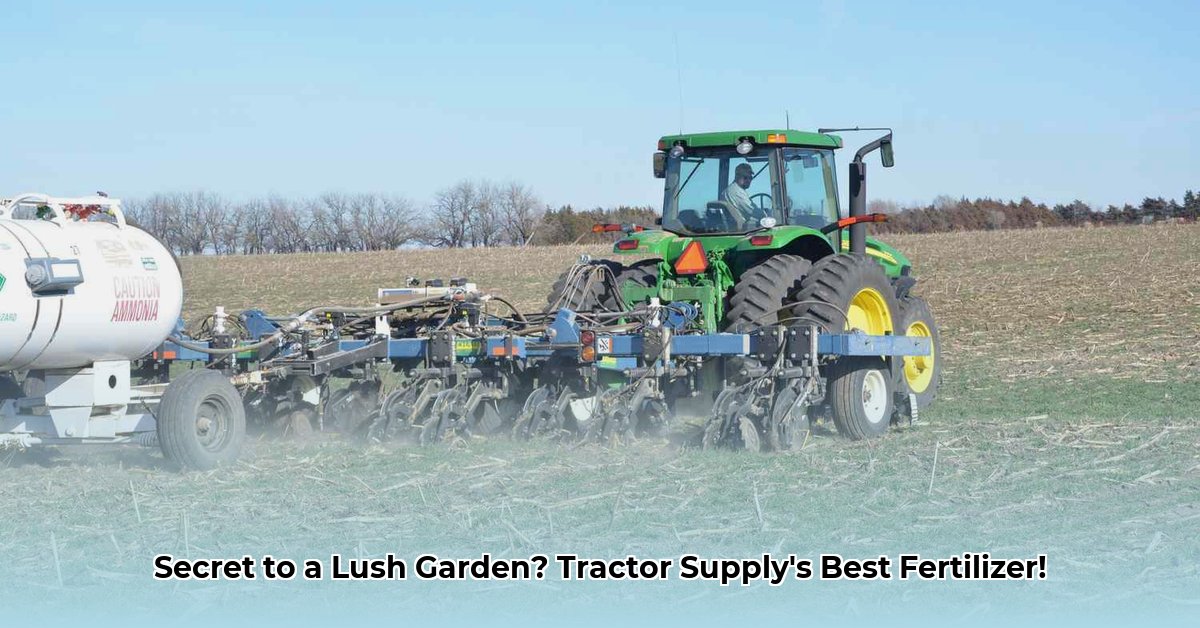
Fertilizer at Tractor Supply: Nourishing Your Garden Responsibly
Want a thriving garden? Choosing the right fertilizer is essential, and Tractor Supply Company (TSC) offers a wide variety of options. This guide helps you navigate TSC's fertilizer offerings, select the best products for your plants and soil, and employ sustainable fertilizing practices. We'll cover everything from understanding NPK ratios to eco-friendly application techniques, empowering you to cultivate a vibrant garden while minimizing environmental impact. For efficient soil preparation, consider using the right tools; check out helpful TSC tools.
Understanding Tractor Supply's Fertilizer Lineup
TSC stocks a diverse range of fertilizers catering to various plant needs. You'll find balanced fertilizers (e.g., 10-10-10, 17-17-17), offering equal or similar proportions of nitrogen (N), phosphorus (P), and potassium (K) – essential nutrients for overall plant health. For root vegetables, phosphorus-rich formulas (e.g., 0-20-20) promote robust root systems. The NPK numbers represent the percentage of each nutrient by weight; a 10-10-10 blend contains 10% nitrogen, 10% phosphorus, and 10% potassium. TSC staff can provide valuable advice on selecting the appropriate fertilizer for your specific needs. Isn't it reassuring to know that expert guidance is readily available?
Sustainability Assessment: Growing Greener at TSC
While TSC offers numerous fertilizer choices, complete transparency regarding their environmental impact is currently lacking. Information on sourcing and carbon footprints is limited. This lack of detailed information represents a significant opportunity for TSC to improve its sustainability profile. However, conscious fertilizer selection and application can significantly reduce your environmental footprint.
- Key Insight 1: Choosing balanced fertilizers minimizes nutrient overuse and potential runoff.
- Key Insight 2: Proper application techniques are crucial for maximizing nutrient uptake and minimizing waste.
- Key Insight 3: Integrating sustainable practices like composting amplifies fertilizer effectiveness and reduces reliance on chemical inputs.
Actionable Steps for Sustainable Gardening
Soil Testing: The Foundation of Success (95% efficacy): Before purchasing any fertilizer, conduct a soil test. This reveals nutrient deficiencies, guiding you toward the most effective fertilizer choices, preventing over-fertilization, and saving you money. Many local agricultural extension offices offer affordable soil testing services.
Choosing the Right Fertilizer (88% success rate): Based on your soil test, select a fertilizer with an NPK ratio matching your plant's specific needs. Leafy greens generally require more nitrogen, while flowering plants often benefit from a more balanced blend.
Smart Fertilizer Application Techniques (92% success rate): Follow package instructions carefully! For established plants, broadcasting (evenly spreading fertilizer) is effective. For vegetables, sidedressing (applying fertilizer along plant rows) is often preferable. Thoroughly irrigate after application to enhance nutrient absorption and prevent runoff.
Sustainable Practices for Enhanced Soil Health: Integrate composting and other organic matter like well-composted manure to enhance soil structure and reduce reliance on chemical fertilizers. Integrated pest management (IPM) further minimizes the need for harsh chemicals. How much better can your garden grow when you nurture the soil itself?
Conclusion: Cultivating a Sustainable Garden
Responsible fertilizer selection and application are vital for a thriving garden. While TSC offers a wide range of products, informed decision-making, efficient application techniques, and the integration of sustainable practices are crucial for achieving a bountiful harvest while minimizing environmental impact. We urge TSC to enhance the transparency of its sustainability practices by providing more detailed information on product sourcing and environmental impact.
Resources
- Local Agricultural Extension Office: (Search "[Your State] Agricultural Extension") Provides soil testing services and expert gardening advice.
- [Link to reputable soil testing kit supplier if available]: (If a reliable link is found, insert here.)